Books
Books
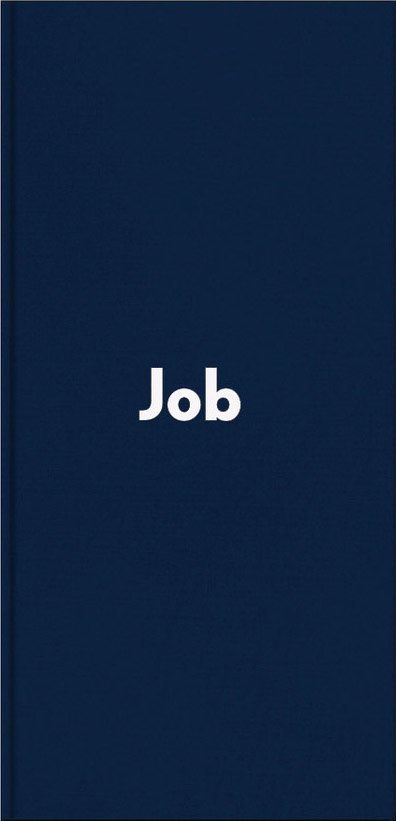
Job Interviews
“The ritual of the job interview can be considered as a courtship that’s conditioned by protocols that ask for a quite particular display: with social relations as material, a dance of conformity, the attempted imagining and echoing of expectations.”
This anthology of commissioned writing includes contributions by Nadim Abbas, Howie Chen, Heman Chong, Matthew Dickman, Jason Dodge, Angie Keefer, Holly Pester, Natasha Soobramanien, Marina Vishmidt, and Jonas Žakaitis.
Edited and illustrated by Chris Evans, and co-published with Para Site, Hong Kong.
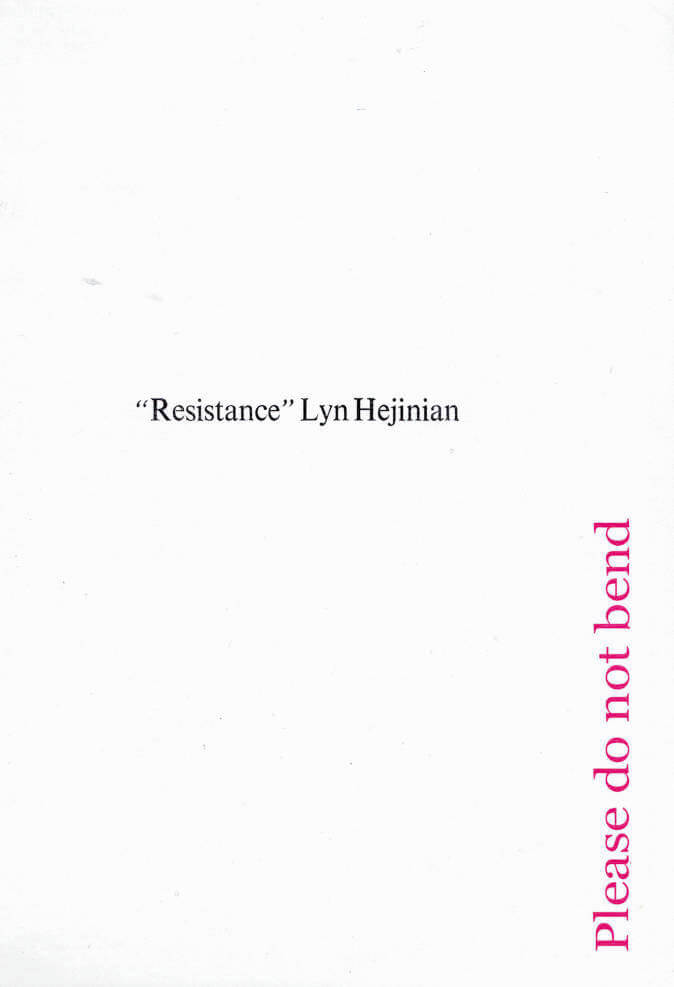
“Resistance”
Lyn Hejinian’s unpublished prose poem which (in her better-known essay The Rejection of Closure) the author reads closely as model for various, open, equitable relations between language and things (such as human bodies, as emphasised in a commentary exploring the destituent potential of Hejinian’s faltering poetic corpus, in “A Draft of Resistance” by Andrea di Serego Alighieri), in an envelope.
1. Lyn Hejinian’s unpublished prose poem which (in her better-known essay The Rejection of Closure) the author reads closely as model for various, open, equitable relations between language and things (such as human bodies, as emphasised in
2. A commentary exploring the destituent potential of Hejinian’s faltering poetic corpus, in “A Draft of Resistance” by Andrea di Serego Alighieri), in
3. An envelope.
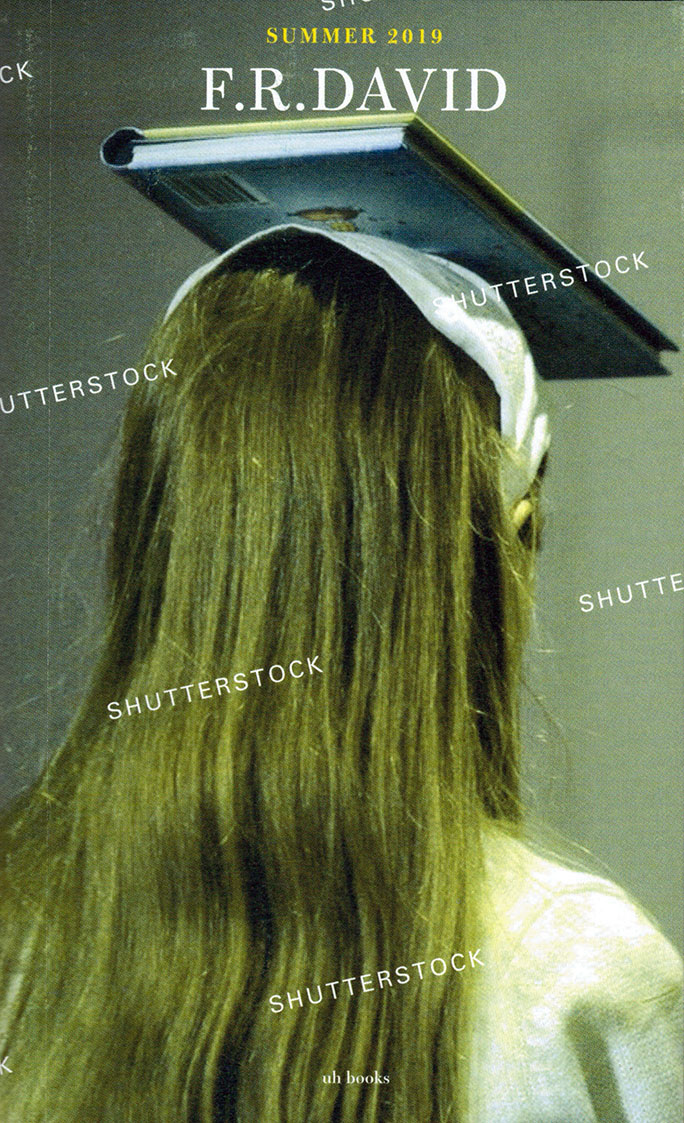
F.R. David - Recto Verso
F.R.DAVID is a typographical journal, dealing with the organisation of reading and writing in contemporary art practises. The 18th issue, “Recto Verso” is edited by Will Holder, and had its beginnings in prosody, the measure of language, geometry, and a notion of imagist transcription, even. A two-dimensional exercise, it turns out, on paper. Words were tuned out, in favour of the volume of values our bodies exchanged: “the historical and bodily movement of language amongst subjects.” Attentions turned—taking (the measure of) classes in body language: the non-verbal: the insinuated: the reverse-side of image: the backside, and, oddly: Oh no: we don’t speak about that—to the next page…
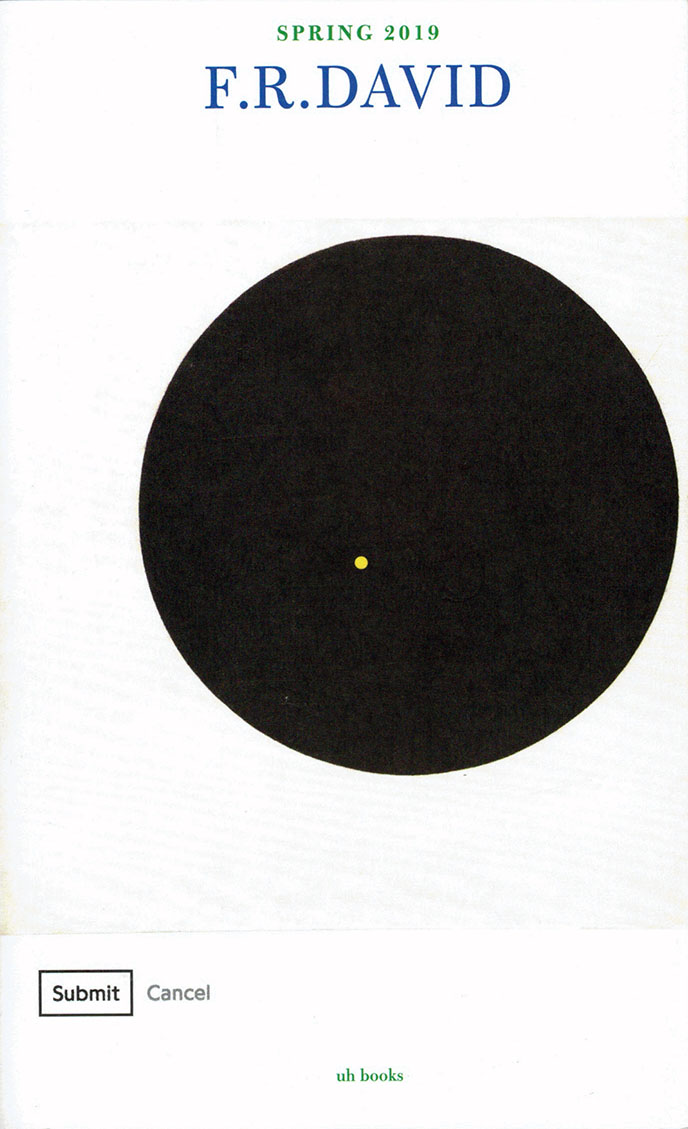
F.R. David - Black Sun
“Black Sun” the 17th issue, edited by Will Holder in conversation with Krist Gruijthuijsen, to accompany the exhibitions David Wojnarowicz Photography & Film 1978–1992, Reza Abdoh, and TIES, TALES AND TRACES. Dedicated to Frank Wagner, Independent Curator (1958–2016), at KW Institute for Contemporary Art, Berlin. The issue departs from Wojnarowicz’s grief at the loss of loved ones during the 1980s AIDS crisis, and anger at the US government for their willful neglect of this loss.
The issue assembles a chorus of various gendered and sexual positions, all seeking support, love and intimacy in linguistic, architectural and bodily structures, all the while under threat of collapse. These voices are threaded together with excerpts from Julia Kristeva’s white, feminist, psychoanalytical, semiotic Black Sun. Depression and Melancholia (1992).
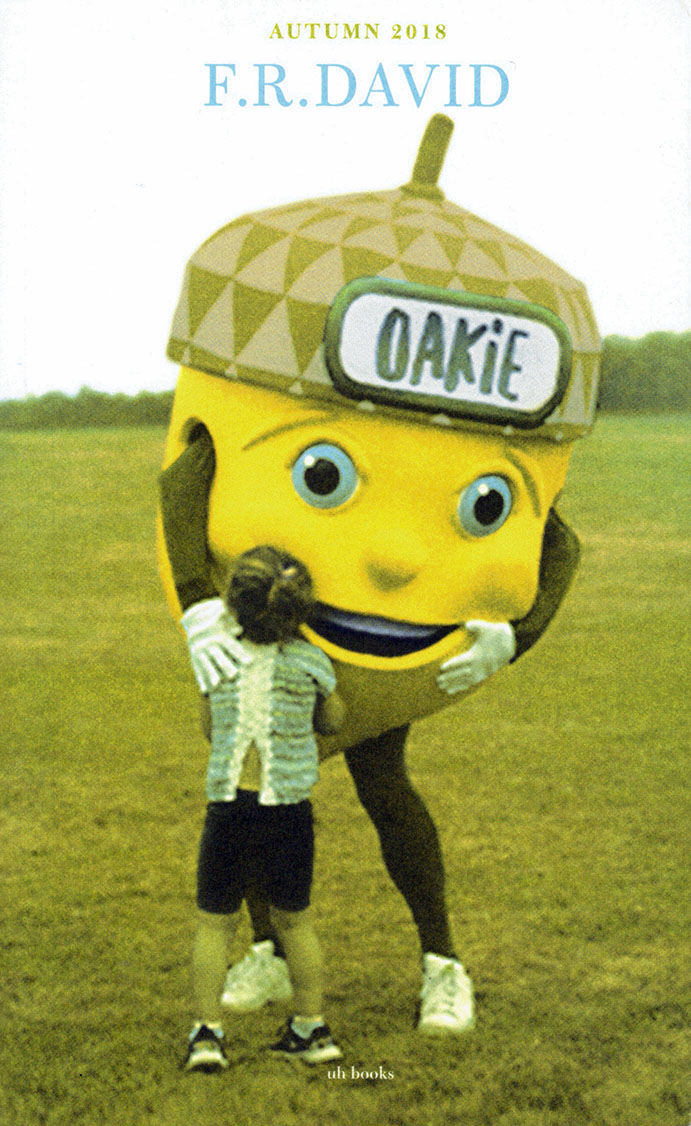
F.R. David - what I mean is—
F.R.DAVID is a typographical journal, dealing with the organisation of reading and writing in contemporary art practises. “what I mean is—” the 16th issue, edited by Will Holder.
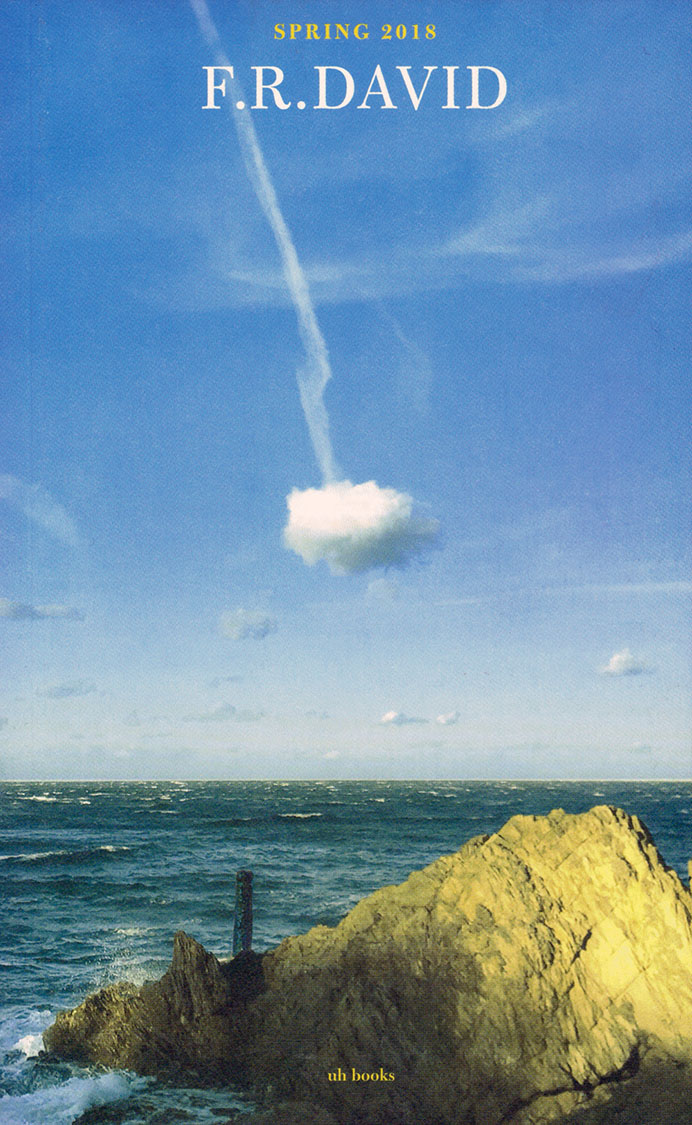
F.R. David - Flurry
F.R.DAVID is a typographical journal, dealing with the organisation of reading and writing in contemporary art practises. “Flurry” is the 15th issue (a best-of, of sorts) edited by Will Holder. “I realized very slowly over a period of time that the activity of framing a performance and the intentions that accumulate around that activity produce a certain anxious kind of mode, and I became bothered by the flurry of activity and how it tends to mask so many things.”
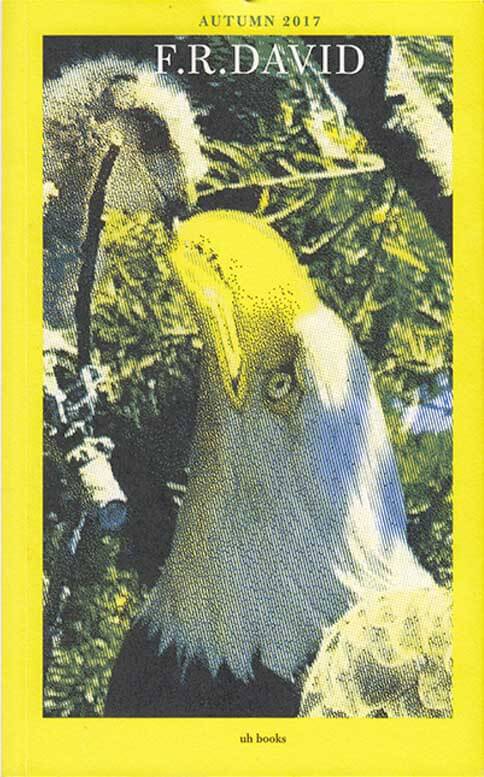
F.R. David - Recognition
“Recognition” is concerned with bodies, ecology, empathy, gazing at the world, and reading (environments) from non-anthropocentric POVs—nonetheless described and written by humans. Animals, birds, and trees feature heavily.
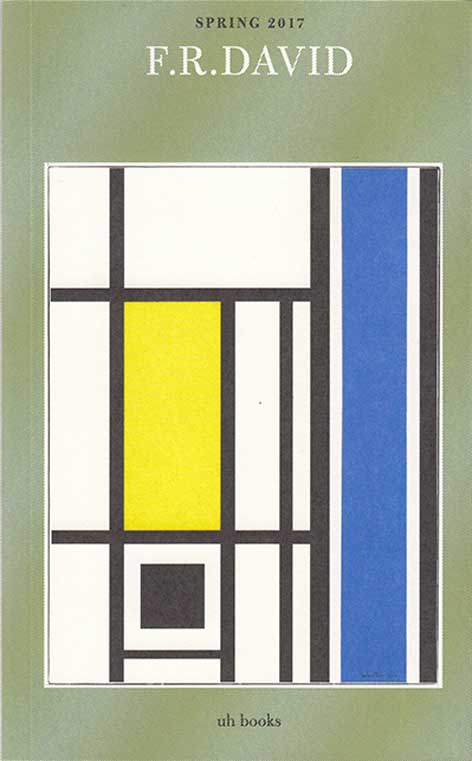
F.R. David - Inverted Commas
F.R.DAVID is a typographical journal, edited by Will Holder, dealing with the organisation of reading and writing in contemporary art practises. This 13th issue of F.R.DAVID is edited with Riet Wijnen, and has its origins in her Registry of Pseudonyms, an online database which accounts for who is who and why who is who. ‘Inverted Commas’ follows ‘pseudonym’ through names, naming, bodies, brains, self, author, other, reader, labour.
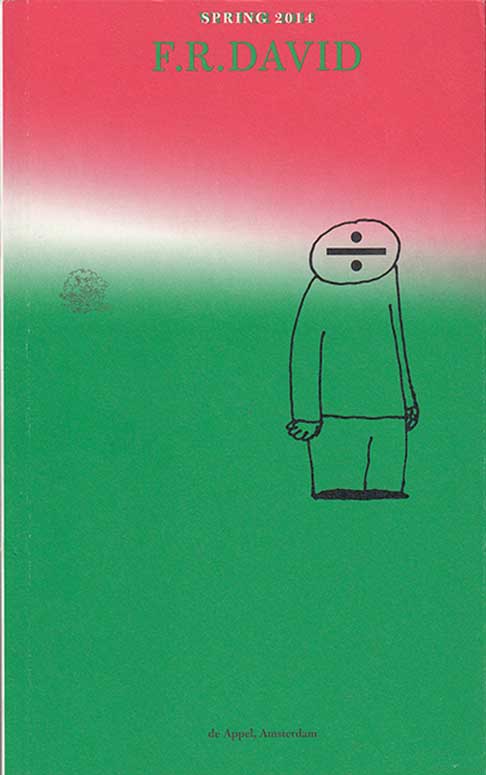
F.R. David - All distinctions are mind, by mind, of mind
F.R.DAVID is a typographical journal, dealing with the organisation of reading and writing in contemporary art practises.
This issue, “All distinctions are mind, by mind, of mind”, has a split personality, allowing comparative readings between left/ right, good/ bad, manic/ depressive.
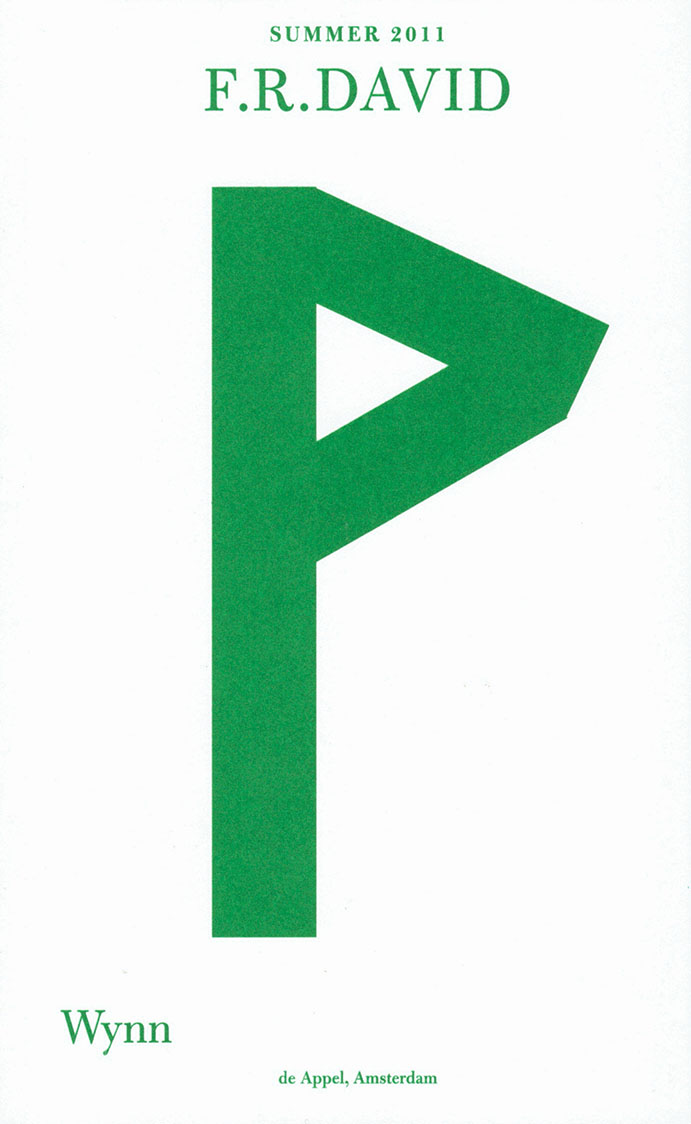
F.R. David - Spin Cycle
F.R.DAVID is a typographical journal, dealing with the organisation of reading and writing in contemporary art practises.
This issue, "Spin Cycle", is concerned with captioning, commentary and description. Edited with Mike Sperlinger.
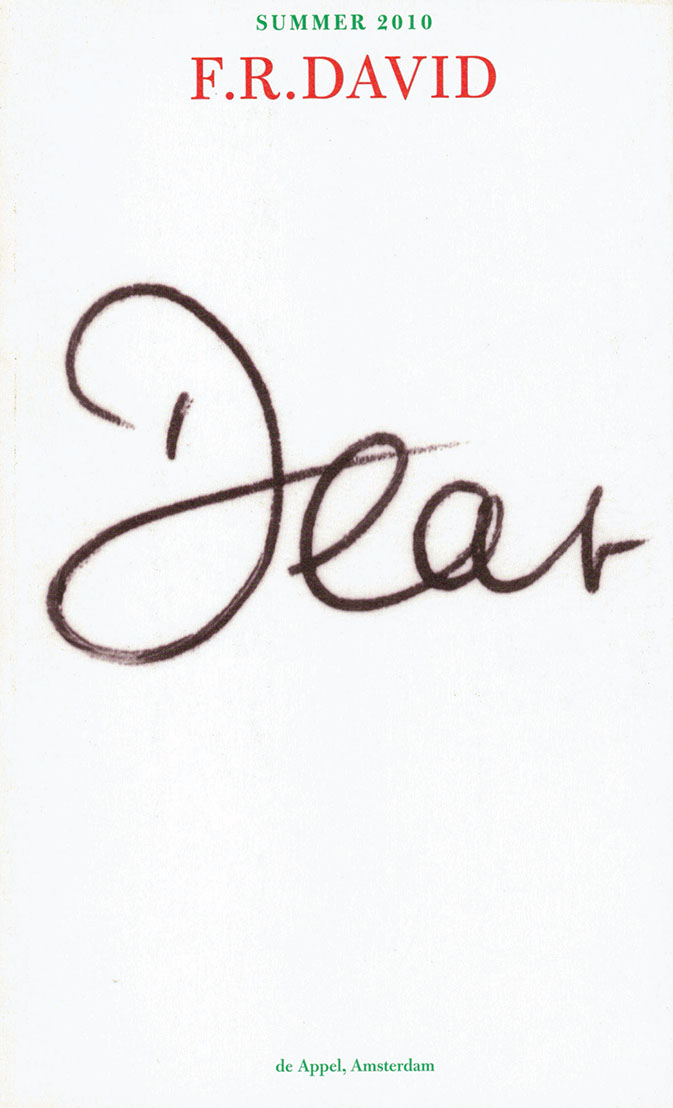
F.R. David - With Love
F.R.DAVID is a typographical journal, dealing with the organisation of reading and writing in contemporary art practises.
“With Love,” takes correspondence and calligraphy—or letter-writing—as model for information theory, and adaptive, cybernetic relations.
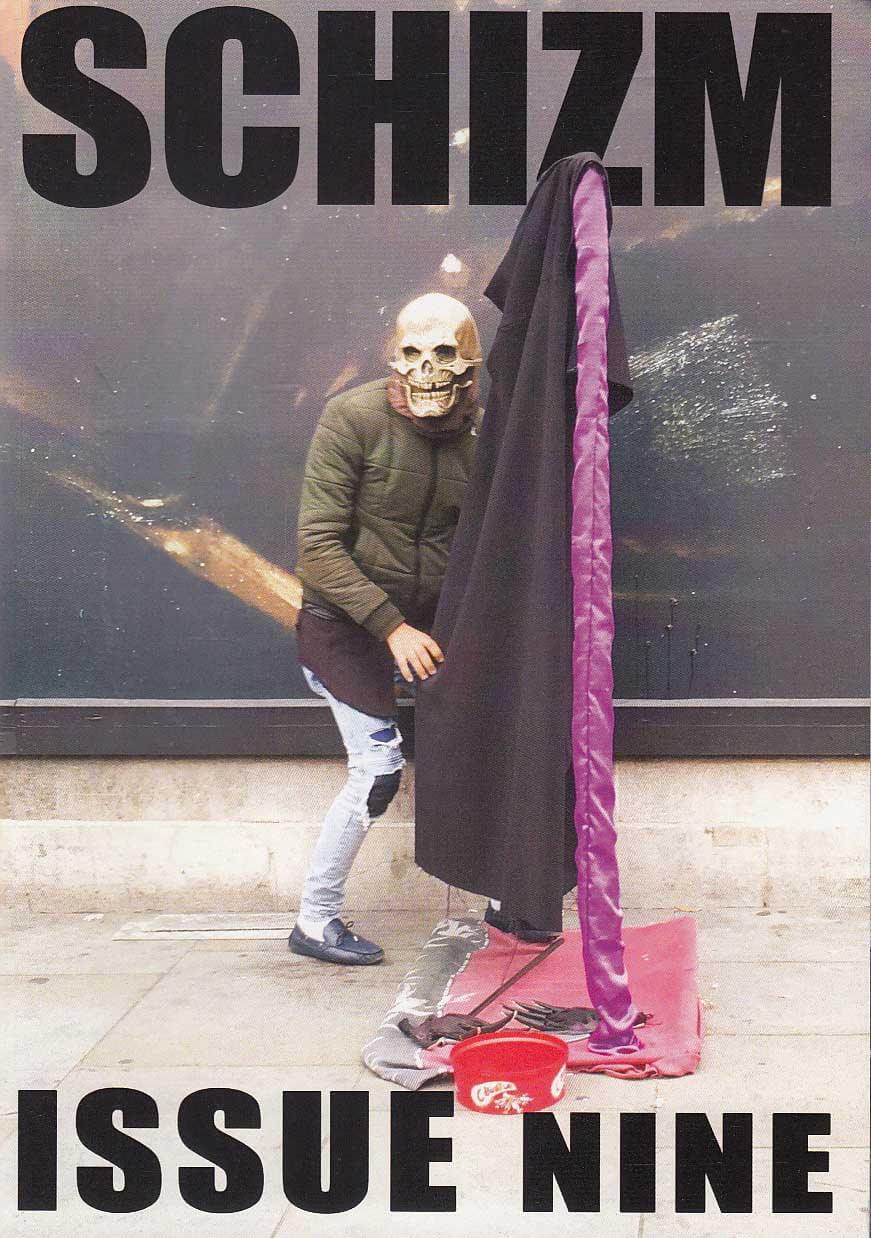
#9 Schizm Magazine
DUPLICITY (Polarisation & Truthiness) CONTRIBUTORS: Naomi Afrassiabi, Bob Ajar, Noah Angell, Sam Basu, Simona Brinkmann, Arnaud Desjardin, John Chilver, Luke Dowd, Patrick Goddard, Kathi Hofer, Catherine Hughes, Nik Jaffe, Tibor Kuo, Agata Madejska, Benja Sachau & Fiona Sarison.
Schizm Magazine invites contemporary artists and writers to contribute pages in response to a theme which, as the title implies, engages with a paradoxical idea. Each issue combines archival material with original works and texts sent in by between ten to thirty contributors.
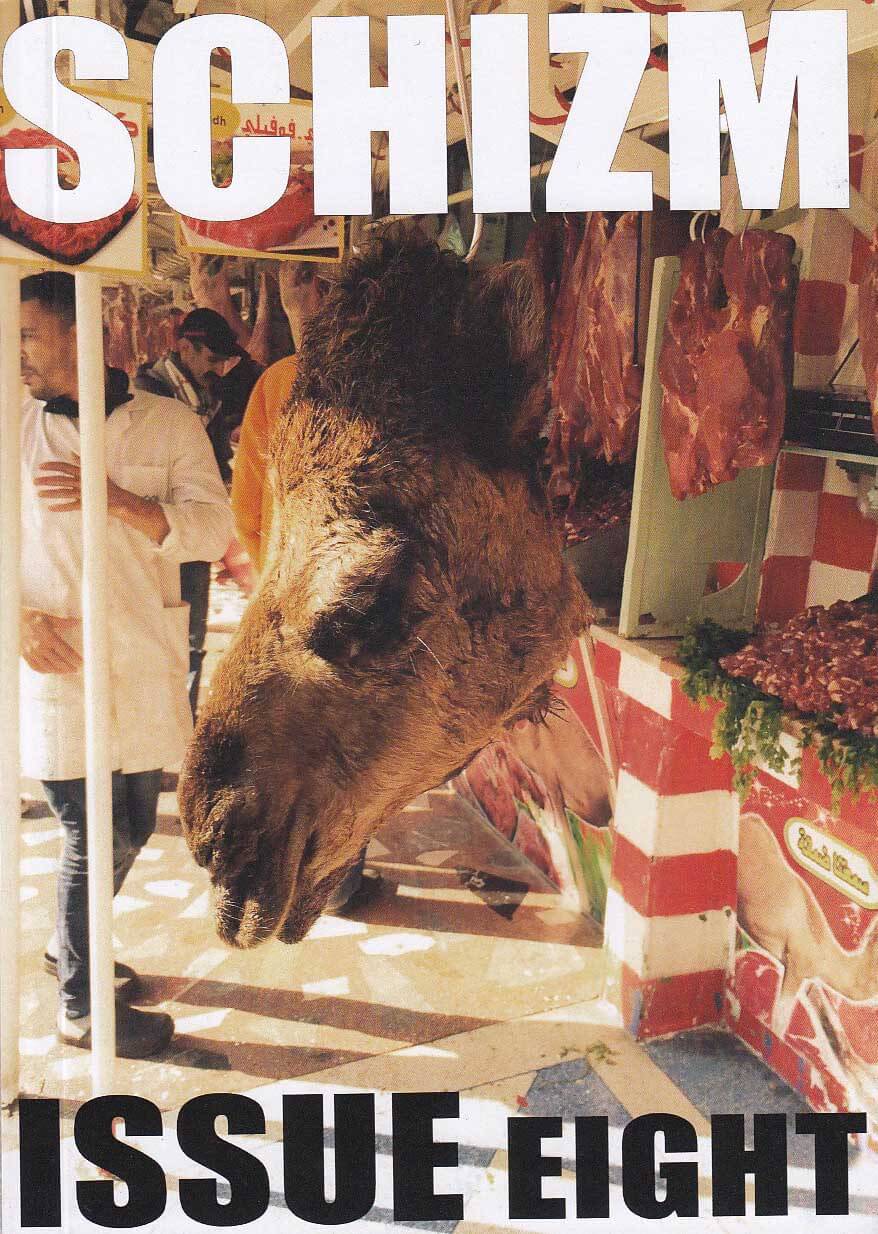
#8 Schizm Magazine
SKEPTICAL UNCERTAINTIES (false truths & honest lies)
Contributions by Bob Ajar, Pedro Diego Alvarado, Aureliano Alvarado, Sam Basu, Manuela Barczewski, Iphgenia Baal, John Chilver, Paul Philipp Heinze, Thomas Helbig, Jaakko Juhani Karhunen, Paul Johnson, George Macbeth, Christoph Meier, Sascha Mikloweit, Mocellin Pellegrini, Pages, Tomas Rydin, Adam Rompel, Fiona Sarison, Barry Sykes, Eleanor Vonne Brown, Markus Vater. Schizm Magazine invites contemporary artists and writers to contribute pages in response to a theme which, as the title implies, engages with a paradoxical idea. Each issue combines archival material with original works and texts sent in by between ten to thirty contributors.

#7 Schizm Magazine
UPWARDLY/DOWNWARDS.
Contributions by Bob Ajar (NY), Jessica Bard (NY), Sam Basu (FR), Paul Birbil (NY), David Burrows (LND), John Chilver (LND), Lisa Conrad (CA), Nina Katchadourian (NY), James Chance (MEX), Jon Kinzel (NY), Roy Kortick (NY), Emily Kuenstler (CA), Cedar Lewisohn (LND), Drea Marks (MA), Francesca Mannoni (NY), & Elizabeth Tisdale (NY).
Schizm Magazine invites contemporary artists and writers to contribute pages in response to a theme which, as the title implies, engages with a paradoxical idea. Each issue combines archival material with original works and texts sent in by between ten to thirty contributors.

#6 Schizm Magazine
ACCESS/EXCESS (coercion, proliferation & mutation)
Contributions by Bob Ajar, Maziar Afrassiabi, Sam Basu, Matt Calderwood, John Chilver, Rhys Coren, Patrick Coyle, Arnaud Desjardin, Catherine Hughes, Thomas Lock, Paul McDevitt, Sean Parfitt, Cornelius Quabeck, Chico Stockwell and Katarina Zdjelar.
Schizm Magazine invites contemporary artists and writers to contribute pages in response to a theme which, as the title implies, engages with a paradoxical idea. Each issue combines archival material with original works and texts sent in by between ten to thirty contributors.
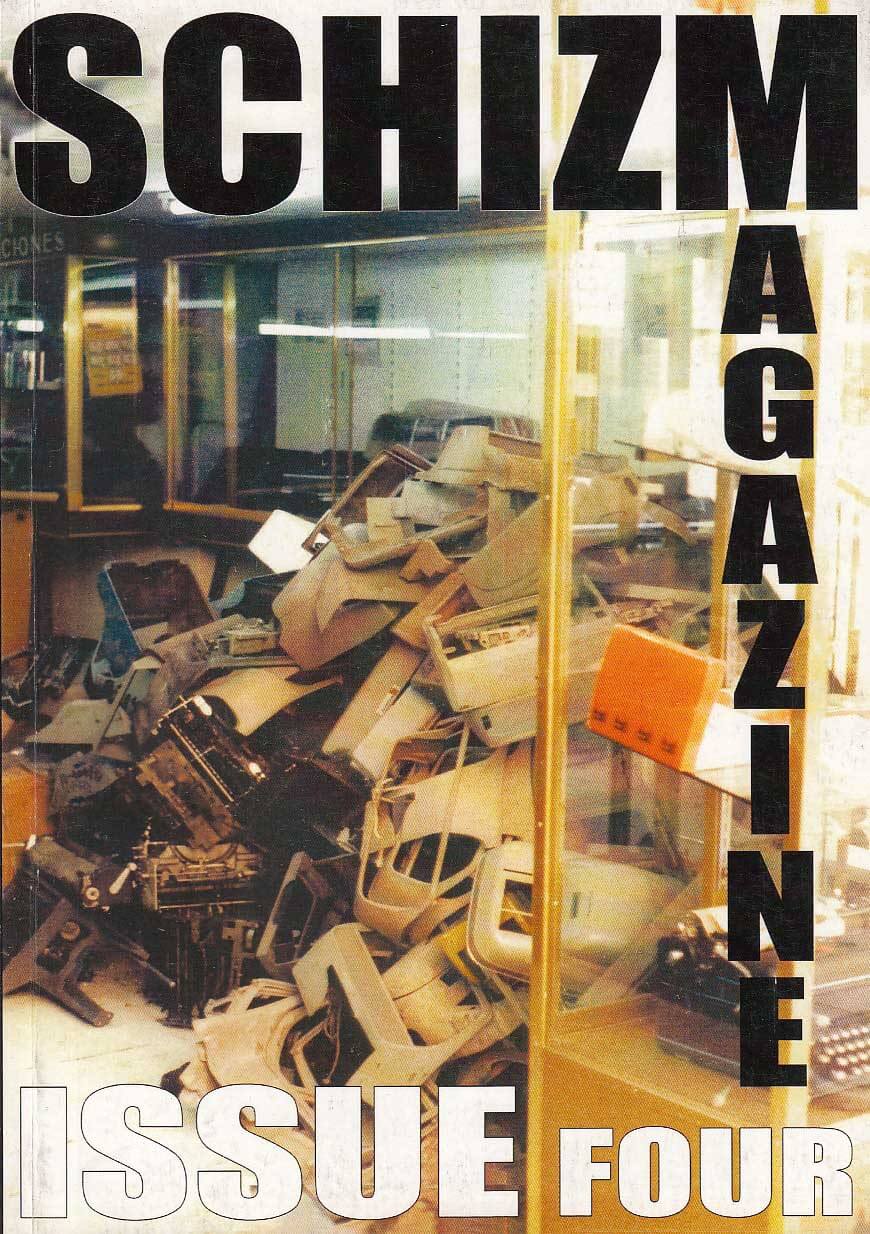
#4 Schizm Magazine
NOW (obsolescence, regeneration & criticality)
CONTRIBUTORS: Bob Ajar, Shahin Afrassiabi, Michael Andreae, Noah Angell, Caline Aoun, Mike Ballard, Sam Basu, Manuela Barczewski, Paul Buck, John Chilver, Ami Clarke, Craig Cooper, Alexandre Da Cunha, Doyle and Mallinson, Alasdair Duncan, Deborah Farnault, Charles Gute, Michael Hampton, Friederike Hamann, Ed Jones, Dean Kenning, Sara Knowland, Cedar Lewisohn, Leonard Manasseh, Alastair Mackinven, Sascha Mikloweit, Anne Redmond, Giorgio Sadotti and Stephen Setford.
Schizm Magazine invites contemporary artists and writers to contribute pages in response to a theme which, as the title implies, engages with a paradoxical idea. Each issue combines archival material with original works and texts sent in by between ten to thirty contributors.

The Straight Mind
A collection of political, philosophical, and literary essays from the acclaimed novelist and French feminist writer Monique Wittig. Monique Wittig's first collection of essays centering on women's struggle for liberation from sexism and classism. These nine essays comprise a thoughtful and unique approach to the study of historical materialism and dialectics, and transverse philosophical, political, and literary theory.
Monique Wittig describes this collection as a focus on "lesbian materialism," in which she examines men and women as distinct classes rather than as "essentialist" categories. "Lesbians are not women," writes Monique Wittig, and she presents powerful ideas about how the idea of "woman" is socially constructed and used to convey certain images. It is not enough, she argues, to transform economic oppression because not all oppression is, at the source, economic.
Sexism will continue to exist even in a society where all people have equal economic opportunities. Only by transforming our thought processes, and in turn, our language, can we transform our society into one in which there is no longer the dominant and the dominated: "In other words, this means there cannot any longer be women and men, and that as classes and categories of thought or language they have to disappear, politically, economically, ideologically." Controversial and abstract, these are essays that challenge and provoke on both intellectual and emotional levels.
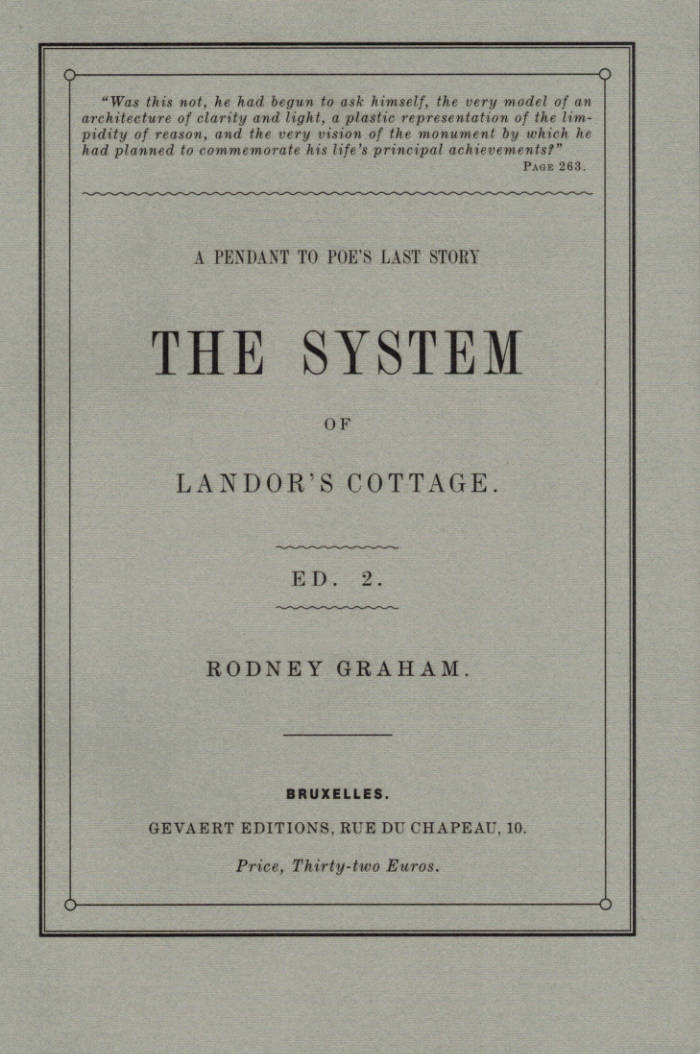
The System of Landor's Cottage. A Pendant to Poe's Last Story
Rodney Graham's The System of Landor's Cottage: A Pendant to Poe's Last Story is the most ambitious of the textual interventions that contributed to Graham's emergence onto the international art scene in the 1980s.
Part 'pataphysical investigation, part Roussellian exercise, the text begins with Edgar Allan Poe's short story "Landor's Cottage: A Pendant to 'The Domain of Arnheim,'" which describes a waylaid traveller's encounter with an uncannily pristine landscape and cabin in the Hudson River Valley. Into this short tale, which numbers less than twenty pages in most editions, Graham inserts an entire novel centered around an annex to Poe's original structure that houses a fantastical machine.
Through a complex set of nested tales, the origins of the machine become clearer but no less magical, and readers will be held rapt by accounts of architectural wonders, a mysterious cipher, and the romance of impossible science.

A Generous Spirit: Selected Work by Beth Brant
Sinister Wisdom and Inanna Publications & Education Inc. are proud to present a new volume of the work of Native American writer Beth Brant, edited by Janice Gould.
A Generous Spirit: Selected Work by Beth Brant collects the writing of Beth Brant, Mohawk lesbian poet, essayist and activist. During her life, Brant’s work gave voice to an often unacknowledged Two-Spirit identity, and today, her words represent continued strength, growth, and connection in the face of deep suffering.
A Generous Spirit is Brant’s portrait of survival and empathy at the intersection of Native American and lesbian experience. A Generous Spirit recounts and enacts the continuance of her people and her sisters with distinct, organic voices and Brant’s characteristic warmth. Her work is a simultaneous cry of grief and celebration of human compassion and connection in its shared experience. Through storytelling, her characters wrest their own voices from years of silence and find communion with other souls.
With a substantial introduction by Janice Gould situating Brant in a broader political and literary context, a foreword by acclaimed Canadian poet Lee Maracle, and a moving afterword by scholar and poet Deborah Miranda, A Generous Spirit is a tribute to the influence of Brant on a generation of Indigenous writers.

Be Here Now

My Emily Dickinson

Vampyroteuthis Infernalis
Flusser introduces an infernal creature from the oceanic abysses, who slowly emerges, not from the oceans, but from man's own depths to gaze spitefully into his eyes and reflect back at his own existence.
Originally published only in German in 1987, this version has been edited and translated by Rodrigo Maltez Novaes, Ph.D. candidate at the European Graduate School, Saas-Fee, under the supervision of Prof. Dr. Siegfried Zielinski, from the original, unpublished and extended Brazilian-Portuguese version of the manuscript recently found at the Vilém Flusser Archive at the Universität der Kunst, Berlin. This edition is also accompanied by a selection of previously unpublished excerpts from Flusser's correspondence with Milton Vargas and Dora Ferreira da Silva, with whom he discussed the development of the present text.

Cyberpositive
0(rphan)d(rift>)'s Cyberpositive is an experimental sci fi theory-fiction that streams a group of asked and unasked contributors writing, sampled and edited by 0D's Maggie Roberts. It was published in 1995 with support from Nick Land and Cabinet Editions, serving as a manifesto and as the catalogue for the debut exhibition of the same name. It came together in the spirit of much of 0D's visual work, bringing together processes of sampling and looping as well as the Burroughs text cut up technique, referring to a breakdown and reordering of language from a post human POV.

What's the Use?
In What’s the Use? Sara Ahmed continues the work she began in The Promise of Happiness and Willful Subjects by taking up a single word—in this case, use—and following it around. She shows how use became associated with life and strength in nineteenth-century biological and social thought and considers how utilitarianism offered a set of educational techniques for shaping individuals by directing them toward useful ends.
Ahmed also explores how spaces become restricted to some uses and users, with specific reference to universities. She notes, however, the potential for queer use: how things can be used in ways that were not intended or by those for whom they were not intended. Ahmed posits queer use as a way of reanimating the project of diversity work as the ordinary and painstaking task of opening up institutions to those who have historically been excluded.